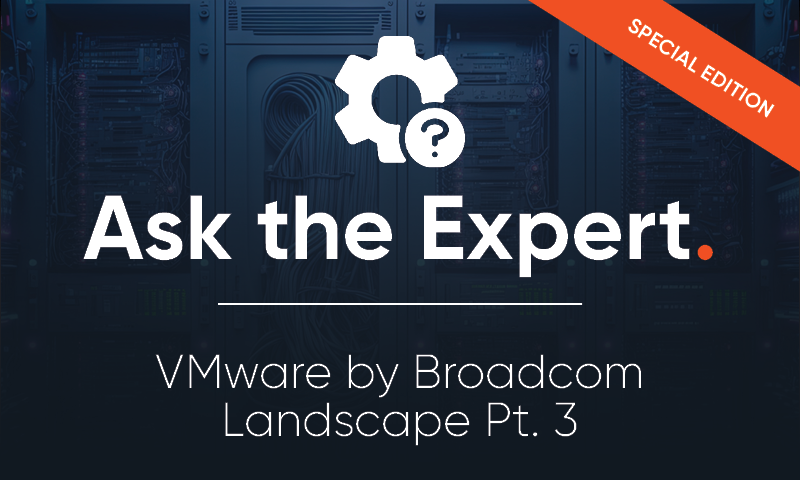Christine Austria and Curvature’s Server & Storage Solutions Sales Engineer, Matt Swann, is back for the third and final episode of our special series of Ask the Expert delving into the Broadcom acquisition of VMware. In this episode, Matt discusses how our clients can mitigate some of the big changes from our previous episodes.
Christine: Hello everyone, I’m Christine Austria and welcome back to the third and final episode of our Broadcom-VMware edition of Ask the Expert. Today, Matt Swann, our Server and Storage Solution Sales Engineer, is going to discuss how our clients can mitigate some of the big changes we’ve discussed in previous episodes. How do you want to start today, Matt?
Matt: Thanks, Christine. Let’s focus on the concept of rightsizing. As I mentioned in the previous episode, some clients may have opted for higher core count CPUs than they needed strictly because they were going to be paying the license cost for the additional cores regardless. So now is a critical time for users to look at rightsizing their environments, which is the process of taking an inventory of their current hardware (specifically CPUs and memory in this case) and comparing it against their true hardware needs. If there’s a mismatch between the two, users have the chance to either update their hardware by replacing CPUs, or doing a complete hardware refresh if it makes sense. While this might lead to a larger upfront hardware cost, it may have the potential to save a large amount of money in the long run by not paying for extra licensing CPU cores you don’t actually need.
Christine: What’s next, Matt?
Matt: If you’re worried about the licensing changes specifically for vSAN potentially leading to a sharp jump in licensing costs, it’s also worth considering moving to a siloed external solution instead. I know a lot of users enjoy the vSAN product offering, but there are also a good amount of hardware storage offerings that can provide many good benefits surrounding efficient data storage and disaster recovery. So, if your company is currently standardized on vSAN but you’re looking to avoid the storage-based subscription costs, now may be a good time to see if switching to a dedicated storage array might be a good idea as a long-term storage solution.
Christine: Okay, so when it comes to rightsizing hardware or moving to siloed external storage, I assume our customers are going to need some assistance. How are we able to support them with these things?
Matt: Absolutely. Everything I’ve mentioned so far is a lot easier said than done. To assist our customers with navigating the way forward, we’re partnering with our parent company Park Place Technologies to offer varying levels of support and service. Whether you want to stick with your perpetual licenses for a bit longer, right size, or do a complete hardware refresh, we’re here to help. So just reach out to your Curvature or Park Place account rep for more info.
Christine: Thanks again, Matt, for giving us all the info on the new VMware by Broadcom Landscape. If you missed our blog on this topic or want to read more in-depth detail on these changes, we will link our blog in the comment section. As always, if you have any other questions for any of our sales engineers, feel free to leave a comment below or contact us. And we’ll see you next time on Ask the Expert.
For questions about the VMware Acquisition, reach out to one of our skilled sales engineers today.



